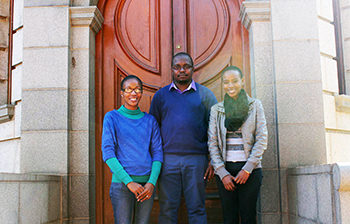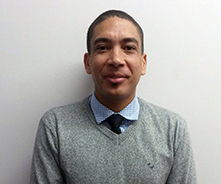Latest News Archive
Please select Category, Year, and then Month to display items
21 April 2021
|
Story Eugene Seegers
|
Photo Supplied
 Adelia Chauque graduated with distinction during the April Virtual Graduations hosted by the UFS.
Adelia Chauque graduated with distinction during the April Virtual Graduations hosted by the UFS.
On 20 April 2021, 693
South Campus students graduated during a
virtual ceremony, with 213 of them achieving distinctions. One of these is
Adelia Chauque, the newly elected South Campus SRC member for Policy and Transformation. During her journey as a student, Adelia says that she had numerous obstacles to overcome. For instance, she mentions that her “biggest challenge was completing my tasks with an unstable data connection during the pandemic”. Despite this impediment, Adelia managed to excel in her studies and obtained her qualification with distinction.
Adelia says her family was her biggest support system. “Due to the network problems that I faced my family had to drive me around until we found a stable connection that enabled me to write my tests.” Other support came from the university itself. “I received a lot of support from the academic adviser, Mr Chwaro Shuping,” she says. “Although he couldn't arrange for me to return to campus, he called regularly to ensure that I was still academically active.”
After overcoming these hurdles, Adelia is continuing her academic journey. “I am enthusiastic and eager to learn or to better myself. Due to that, I am furthering my studies by enrolling for a second degree programme in
Administration majoring in Industrial Psychology. I am very ambitious, in the sense that I strive for perfection and consistency with an organised and maintainable future, therefore being part of the SRC enables me to assist students and myself with a secured and comfortable learning environment to achieve our goals at the institution.”
Adelia balances her responsibilities in the SRC portfolio of Policy and Transformation on the South Campus by having a schedule planned that ensures she does not fall behind. She concludes, “During the morning, I attend my prescribed lectures to ensure that I will continue to slay academically. Then I am visible in the SRC office from 12:00 to 16:30. After hours, I contribute my time to study, but I remain available to students who prefer texting.” The university is keen to see the heights to which Adelia will attain in the coming years.
“I am enthusiastic and eager
to learn or to better myself.”
Adelia Chauque, South Campus SRC:
Policy and Transformation.
nGAP lecturers welcomed by the UFS academic community
2016-06-30

University of the Free State’s newly-appointed nGAP
lecturers. From the left, Neo Mathinya,
Phumudzo Tharaga, and Kelebogile Boleu.
The University of the Free State (UFS) was allocated six positions as part of the Department of Higher Education and Training (DHET) New Generation of Academics Programme (nGAP). Four candidates have filled positions in the Faculty of Health Sciences, Faculty of the Humanities and the Faculty of Natural and Agricultural Sciences – with two positions still vacant.
According to Minister of Higher Education and Training, Dr Blade Nzimande, nGAP is part of the Staffing South Africa's Universities Framework, which focuses on the expansion of the size and compilation of academic staff at South African universities, especially with regard to transformation. The focus of the programme is the appointment of black and coloured candidates as well as women.
The Department of Soil, Crop, and Climate Sciences in the Faculty of Natural and Agricultural Sciences welcomed two nGAP lecturers, Phumudzo Tharaga and Neo Mathinya. The Faculty was allocated four positions. Two positions are filled, while two positions in the Department of Animal and Wildlife Sciences are almost ready to be filled with exceptional candidates.
Agrometeorologist with his feet on the ground
Phumudzo Tharaga holds an MSc from the UFS, and is currently pursuing a PhD. Tharaga’s research focuses on quantifying the water use efficiency of sweet cherry orchards under different climate conditions in the Eastern Free State. Tharaga will offer his students a wealth of practical experience, which he began accumulating while working at ABSA as an agro-meteorologist, before moving on to become a senior scientist at the South African Weather Service. In 2015, Tharaga became a research technologist at the Council for Scientific and Industrial Research (CSIR) and then returned to the UFS as an nGAP candidate at the beginning of 2016.

Beynon Abrahams, nGap lecturer
at the Faculty of Heath Sciences
Department of Basic medicine
Motivated scholar turned academic
Neo Mathinya, who hails from Taung in the North West, has made the UFS her home. She received both her undergraduate and honours degrees from the university. Apart from joining the department as a lecturer under the nGAP initiative, she is currently studying for her MSc in Soil Physics. She will continue with this research when she comes to her PhD. Mathinya’s research focuses on soil salinity - the process of increasing salt content - which affects the ability of plants to take up water, a process, known as osmotic stress. She will investigate the effects of irrigation water salinity on the grain yield and quality of malt barley.
Researcher with a passion for crime prevention
Kelebogile Boleu joined the Department of Criminology in the Faculty of Humanities, with a fresh take on diversion and crime prevention. Boleu holds a BA Criminology (Hons) and is now pursuing her Master’s degree. She worked for NICRO a non-profit organisation specialising in social crime prevention and offender reintegration, with programmes that prevent young and first-time offenders from re-offending, thus reducing crime. Boleu said that her practical experience makes her lectures to third-year criminology students exciting. Boleu’s research focuses on analysing the value of pre-sentencing reports in assisting adjudicators to make well-balanced judgments in cases.
Research with a winning plan for fight against breast cancer
Beynon Abrahams joined the Department of Basic Medical Sciences in the Faculty of Health Sciences. Abrahams holds a BSc, BSc (Hons), and MSc in Medical Biosciences from the University of the Western Cape. Abrahams’ Master’s research focused on breast cancer, research on which he is building in his PhD. This doctoral research involves the exploration of P-glycoprotein, a protein expressed on cancer cell and responsible for multi-drug resistance in cancer treatment. The aim of this research is to develop a therapeutic drug treatment strategy that will improve breast cancer patient survival outcomes. Abrahams’s greater vision is to look at conventional cancer therapeutic regimens, to find ways in which they can be improved.
The nGAP initiative offers these young lecturers an opportunity for growth and development as academics, while providing them with opportunities they would have not have been exposed to otherwise.